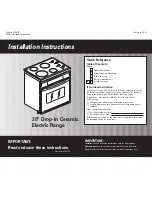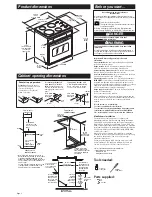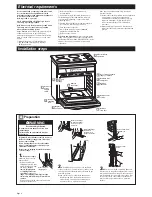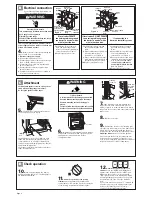
Page 2
Electrical requirements
Installation steps
1.
Turn power supply
off.
Move range close to
final position.
• Remove and discard
shipping materials, tape
and protective film from
the range.
Do Not
remove shipping base
or shipping feet at the
front lower corners of
range. The shipping feet will protect the
lower range trim until range is inserted into
cabinet.
• Remove and set aside oven racks and other
parts from inside oven.
Preparation
A
A
Remove trim
screws.
A
Remove
oven door.
C
Reattach side
trim pieces.
A
Remove
side trim.
C
Remove
shipping
feet.
A
Remove
oven racks.
C
Use screws to attach
range to cabinet.
D
Check cooktop
operation.
C
Grasp oven
frame to
lift range.
D
Check oven
operation.
C
Replace
oven door.
B
Do Not remove
shipping feet.
3.
Remove trim screws attaching right and
left side trim to range. Grasp the bottom end of
trim and pull away from range. Slide top end of
trim downward to remove trim from range. Take
care not to scratch other surfaces with ends of
trim. Set trim and screws aside on protected
surface.
Remove trim screw.
Pull trim out.
Pull top of trim
down.
If codes permit and a separate ground wire is used,
it is recommended that a qualified electrician
determine that the ground path and wire gauge are
in accordance with local codes.
Do Not ground to a gas pipe.
Check with a qualified electrician if you are not
sure range is properly grounded.
Do Not have a fuse in the neutral or ground circuit.
This range must be connected to a grounded
metal, permanent wiring system.
A time-delay fuse or circuit breaker is
recommended.
Connect directly to the fused disconnect (or
circuit breaker box) through flexible, armored
or non-metallic sheathed, copper cable (with
grounding wire).
Flexible armored cable from appliance should
be connected directly to junction box.
Fuse both sides of the line.
A U.L.-listed conduit connector
must
be
provided at the junction box.
Do Not cut the conduit.
Wire sizes and connections
must conform with the
rating of the appliance and to the requirements of
the National Electrical Code, ANSI/NFPA 70 — latest
edition (
**
See Page 1) and all local codes and
ordinances.
If the house has aluminum wiring, follow the
procedure below.
a.) Connect the aluminum wiring to the copper wire
using special connectors designed and
Underwriters Laboratories-listed for joining
copper to aluminum. Follow the electrical
connector manufacturer’s recommended
procedure.
b.) Aluminum/copper connection must conform
with local codes and industry-accepted wiring
practice.
Important: Use both hands to remove oven door.
Do Not use handle or any portion of the front
frame or trim for lifting.
Before moving range across floor, check that
range is on shipping base or slide range onto
cardboard or hardboard.
Do Not remove shipping feet at the front lower
corners of range.
Excessive Weight Hazard
Use two or more people to move and
install range.
Failure to do so can result in back or
other injury.
Connect
power
supply
cable.
WARNING
Range
must
be connected to the proper electrical
voltage and frequency as specified on the
model/serial rating plate. (The model/serial rating
plate is located on the oven door or on the oven
frame.)
Models rated from 12.7 kW at 240 volts
(9.5 kW at 208 volts) require a separate
40-ampere circuit.
2.
Completely open oven door. In both back
corners of the door you will see door latches in the
locked position. Rotate both latches forward to the
unlocked position.
Grasp outside edges of door with both hands.
• Begin closing door, at the moment the door
stops closing, lift and pull door toward you.
• Set door aside on a protective surface.
latch on the hinge
in locked position –
door free to open
and close
latch on the hinge
in unlocked
position – door
ready for removal























